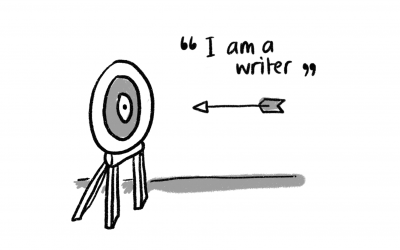I’ve been witness to the precise moment when a book was written. I watched as the words ‘THE END’ were typed, as a long-held goal was achieved. I know the secrets – it involves big goals and tight deadlines, cute kittens and stunning views, and incredible focus. Here’s how to – finally – finish writing your book.
Although she’d written five books before, Alison Jones was struggling to complete this one. It been three years since she had the idea and more than 18 months of research and writing, but the deadline just kept slipping. Last week, deep in the English countryside, she finished writing her first draft, and I was cheering along the way.
I was pet sitting and in need of company. The pets just happened to live in a recently-built, architect-designed house with views across the Axe valley in Devonshire. I was living the mobile working dream – all I needed was my laptop and anti-histamines to counter my cat allergy.
I asked publisher, coach and business writer Alison Jones to join me. Alison had set aside the summer to finish writing her book. ‘Would she,’ I asked, ‘fancy coming to Devon to write?’ She’d arranged childcare before I finished asking the question.
After three days, with nothing but kittens to distract her, Alison finished her first draft. The Red Arrows flew past, the Prosecco flowed and Alison was all smiles and celebrations. It was enough to forget the struggles of getting a first draft written – the missed goals, extended deadlines and the pressure to complete.
Writing a book, particularly one that’s important to you and your business, is tough.
The necessity of writing
You’d think, having written books for other publishers, and running a business publishing other people’s books, that it would be easy to trot off a first draft. But the stakes were high. Alison coaches other people on how writing a book can help their businesses, so it was essential she had her own book to do just that.
There was a huge amount of pressure for her to write – and fast. This can be overwhelming and lead many of us to procrastinate and set unachievable levels of perfectionism.
“This can be overwhelming and lead many of us to procrastinate and set unachievable levels of perfectionism.”
Keeping going – the importance of accountability
To counter this Alison built in accountability structures to keep her going while she wrote, for example she:
- started a podcast interviewing people about the business of writing books.
- wrote in public – giving progress updates on her podcast, website and social channels.
- shared her book outline and contents list online for people to read and comment on.
- set a daily writing goal to publish on her blog every single day.
- guest blogged to share advice and tips from the experts on her podcast and how she’s applied that to her own writing.
- took part in challenges, such as from Prolifiko, and organising writing days where people come together to write.
For many people having a personal goal isn’t enough, so having external accountability provides extrinsic motivation – and extra pressure – to keep going.
>> Read more: The complete guide to writing accountability – hold yourself to account and use others to help you achieve your writing goals
“Having external accountability provides extrinsic motivation – and extra pressure – to keep going.”
Scheduling to make the dream happen
Alison had a goal, and structures to support her, but she just wasn’t reaching the end fast enough. She’d delayed the publication date already, after a big consulting job sucked up all the days she’d blocked out for writing, so with it reset for November she had a fixed deadline.
“Scheduling time to write makes a difference.”
Scheduling time to write makes a difference. When time is booked out in your calendar you treat writing like any other important appointment – you can tell people you’re already committed and don’t schedule other things alongside it.
Alison booked two weeks for writing during her children’s summer holiday and her husband agreed to cover childcare. When I asked if she wanted to join me in Devon, she knew going away to write meant she’d be more likely to stick to her commitment, as well giving her the time to do ‘deep work’.
>> Read more: How to make time to write – 4 approaches to finding time in busy schedules
The plan and practicalities of finishing
Alison arrived Monday evening with time to settle in and admire the view. The next morning she was up, dressed and at her desk for 6am. She had three full days of writing before leaving on Friday morning. The clock was ticking.
The plan was to work through the whole book, editing existing content and filling in the missing sections. The goal was a complete first draft of 50,000 words.
She worked from six in the morning to six at night, with a break for lunch. Her time was allocated into pomodoro – 25 minutes of uninterrupted writing, with five minute breaks. The only interruption was from the kittens who would climb into her lap to sleep or prowl around, and onto, her computer.
“Rewards were essential daily motivation.”
Each night we celebrated with a run in the Axe valley, through woods and fields, or down by the sea. It was a treat – a chance to stretch and move freely after a day hunched over a screen. Rewards like this, and the occasional glass of wine, were essential daily motivation.
The doubt sets in
Alison was storming ahead, sharing with me her increasing word counts and calling out as each section was completed. My job was to cheer each passing milestone.
But time was racing ahead of her. As she got further into the book the chapters were less polished, there were more gaps, new paragraphs to write. Doubt set in.
The benefit of a tight deadline and ambitious goal was that Alison didn’t have the time to panic. All she could do was focus on the next 25-minute Pomodoro, the next chapter to write.
The last day was the most difficult with the deadline fast approaching. She was close but honestly didn’t know whether she’d finish.
>> Read more: 8 types of negative thinking that hold you back as a writer and how to overcome them
The end!
It was approaching 6pm and Alison was flagging as she reached the final sections. One final push was needed.
Then, the book was finished. The draft was complete. Alison had met her goal.
Before she had a chance to cheer, there was rumble in the sky and the Red Arrows flew past on their way to Lyme Regis carnival. Now that’s what you call a moment.
Later, after a run through Axminster, we celebrated with fish and chips, and the finest fizz we could get our hands on. It was amazing to be part of the celebration, and I learnt so much from my ringside seat. Here’s some advice to pass on:
How to finish writing a book
- Set aside time to write and protect it.
- Have a clear goal – know what you want to achieve and by when.
- Make a daily plan, know what you will do each day – and do it.
- Structure your approach to writing – use techniques like pomodoro or time blocking.
- Monitor your progress – word count, pages, chapters or time spent – and celebrate when you hit a milestone.
- Don’t judge your writing especially if you’re working on a first draft – the goal is to finish, not to write the best half-finished book.
- Give yourself something to look forward to at the end of each day, not too big, but something you’ll enjoy for its own sake.
- Go large and celebrate when you achieve you goal.
Thanks to my great friends Sarah and Kevin for letting us stay in their beautiful house.




